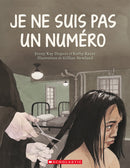Description
Je Ne Suis Pas Un Numéro is the French language edition of I Am Not a Number by Jenny Kay Dupuis. It is the first French language children's picture book by the Ojibwe educator from Nipissing First Nation in Ontario. Dupuis retells the story of her grandmother Irene Couchie Dupuis taken to residential school at the age of eight in 1928. The book opens with the distressing image of the Indian agent standing in the doorway demanding that the eldest three children of Mary Ann and Ernest Couchie attend Spanish Indian Residential School. Despite their pleading the family is forced to relinquish their children to the nuns or face fines and prison time. Residential schools were designed to remove the cultural identity and language of each First Nation child and replace these with a minimal English education. Conditions at the school are recounted through the eyes and perspective of eight-year-old Irene. First all students attending the mission school are scrubbed, had their long hair cut, and are assigned a number rather than using their given names. Irene's number is 759. New rules of behaviour were ingrained in each child from the time they dressed for the day's activities, eating the pitiful offerings of gritty mush and stale bread at meals, and learning the painful lesson of speaking only English. The punishment for speaking Ojibwe were harsh and unforgiving. Daily schedules of prayers, chores, and minimal lessons slowing began to weigh heavily on Irene's outlook. No communications were allowed between parents and their children attending the school. But this story ends on a positive note when the Couchie children return home for summer holidays and the loving arms of their parents. Irene has kept her promise to mother by never forgetting who she was and where she came from. The family enjoys their times together as they eat nourishing meals and find joy amongst themselves. But nightmares lurk in Irene's dreams. Father pledges he will not let the Indian agent apprehend his children again. So when fall weather returns, the Indian agent returns for the children. This time father stands his ground and refuses to allow his children to be educated at the residential school. The account ends with Irene remaining at home and avoiding further pain and abuse at the school. The authors add a three-page spread about the Couchie family, residential schools in Canada, and Jenny Dupuis' afterword. Archival photographs and colour images of Irene and her father allow students to identify with the authentic story of Irene Couchie Dupuis. French language translation is provided by Isabelle Allard. This is a special picture book that brings the truthfulness of oral history to an elementary audience. Highly recommended for elementary and public libraries.


